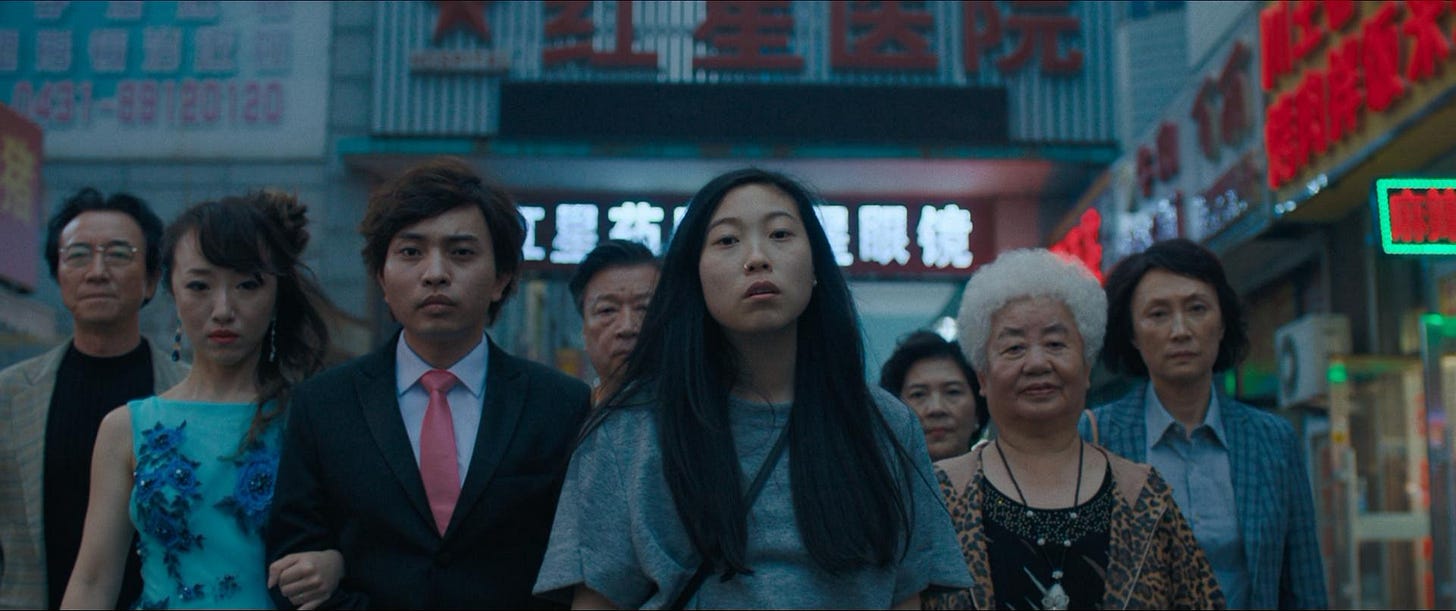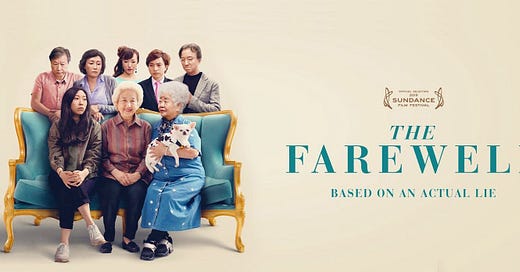Lulu Wang’s 2019 drama comedy makes you disappointed to be yourself.
I mean that in a good way. Because we watch Billi Wang (Awkwafina) struggle with the cultural divide she experiences as being “too American” when she goes back to China to visit her ailing grandmother Nai Nai (Zhao Shu-Zhen).
This is absolutely a slice-of-life into the workings of this specific family, with the added pain of being multigenerational and multicultural (emotional baggage many living the diasporic American dream can relate to). The biggest conflict we see is a secret that the Eastern family is determined to keep, while the Westernized family wants to spill the beans:
Nai Nai is dying of cancer. As per custom, the family refuses to tell her about her diagnosis, instead pretending everything is fine so that her last few months will be lived out in peace.
Billi is horrified, but that’s…tradition. That’s how the family has decided to handle this illness.
There are poignant moments in the film where families representing the East and West go head to head in conversation, throwing stilted words at each other like slaps to the face of “You wouldn’t understand,” “You and your American ways,” “This is how we do things here” abounding throughout.
That is the main conflict in this moment of their lives, and though no one is specifically raised to this status of villain, we can’t help but feel the drama and tension rise as each family member wants to make sure their beloved grandmother will, ultimately, be happy.
Also there’s a fake wedding.
So I highly recommend this movie. For fans of A24’s Everything Everywhere All At Once, The Farewell is something to add to your watchlist.
East vs West and Family Pains

This combat is prevalent from the get-go. Billi’s parents are 1st generation immigrants. Billi is the 1.5, having been born in China but raised in America, her mannerisms and distinct cultural identity is classified as “American.”
While her parents may agree that some things are better in the States, they cannot turn their back on the call of tradition from the Mainland and the lie they communally share to make sure their grandmother is taken care of.
Billi is the black sheep.
She wants to tell her Nai Nai. She wants to share that knowledge and help her through the last of her life and make sure that she knows that she is loved.
Their family in the East believes keeping it a secret is the only way. It is the most humane and respectful way they know how to take care of Nai Nai.
This isn’t even specific to this family, it’s what most families in China decide to do if their loved ones are sick in their old age. They will take care of them to the end, but they will not tell them of whatever ails them to Death’s front door. To know is a heavy burden to bear, and so the family has decided for Nai Nai that they will bear that cross for her.
Billi cannot come to terms with this. A lot of tension stems from Billi’s reprehension of the traditions that they are keeping, and it formulates a conflict of East vs West, community vs individualism, tradition vs modernity.
As someone part of the culture, yet ostracized because of her upbringing, we relate very strongly to Billi. For the most part, we agree with her. The problem is forcing our Western lens on these very Eastern traditions.
Billi’s extended family isn’t trying to hurt her or Nai Nai. In fact, they are just as gutted and devastated that they will be losing Nai Nai and that they cannot tell her. They hold that suffering in, held tight to their hearts, so that they can be around Nai Nai one last time and remember her as is.
It’s…emotionally devastating.
Billi eventually accepts parts of the culture she left behind to come to an agreement with her family, a kind of solidarity that stems from culture and that uplifts people through community effort.
Love Hurts

Why do we even bother to love when it hurts so much? Like goddamn, every love story has a disappointed or stiffed party.
Be it romantic or platonic, there is pain baked into the hearts we carry.
A wound we carry from the first sins of man.
Everyone in this movie is one onion chop away from breaking down and sobbing over the fancy tilework.
Awkwafina, god bless her soul, known for her comedy work, does a pretty bang up job portraying the depths of sadness in this film. It feels weird to see her be so serious, but I don’t hate it.
To lose a lover is a pain we can heal and move on from.
To lose a loved one is a pain we will carry until the end of our days. The memories of them, every scent, every season, every object a harbinger of an emotional break down.
To lie to a loved one as they are dying, knowing exactly what you are doing in order to protect that loved one, is a suffering I have not and hopefully will not have to experience.
Everything is really really sad.
From the subdued colors, to the talents’ moist eyes, to the tremulous music that spirals in the background.
This movie is about the clash of cultures and how in spite of their differences, familial love is something that will never change.
Representation

Is this the best movie to rent from the Blockbuster?
Honestly no it’s really depressing and it makes me cry most every time I watch it. I definitely don’t recommend it if you’re not in a good headspace because it might fuck with that a little too much.
I do believe it is a movie worth watching though. It has such emotional depth, it values and shares cultural things that we, as a very American, Western audience, might not have experienced in our little bubble.
It also has such an amazing Asian cast. Most of them not coined by Hollywood as “top billing” names, but all of them bringing their A-game and demanding your attention. Every character is nuanced and angry/sad at their unfortunate circumstance and with such a large family, varied emotional responses to the events in this movie are to be expected.
We have an Asian story written by an Asian woman for a 2nd generation Asian audience with a wonderful cast of Asian talent. If the story doesn’t make you cry, the sheer representation will.





